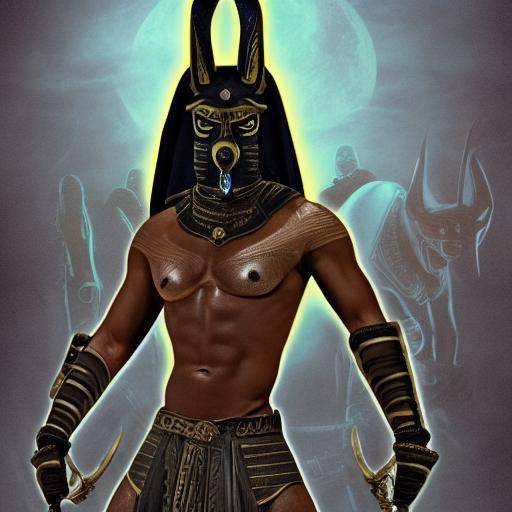
Introduction
Ancient Egypt is full of fascinating myths, gods and rituals that continue to captivate modern imagination. One of the most enigmatic characters of this civilization is Anubis, the Chacal God of Death. In this article, we will explore in depth the figure of Anubis and its role in some of the most relevant aspects of Egyptian culture, such as mummification, weighing of the heart and judgment in the Beyond. Join us on this journey through time and discover the mysteries and importance of Anubis in ancient Egyptian civilization.
History and Background
The history of Anubis dates back to the dawns of Egyptian civilization, where he was venerated as the keeper of the tombs and the person responsible for guiding the deceased in his transit to the Beyond. Represented with a jackal head, Anubis personified the transition between life and death, as well as the process of preserving the body through mummification. Their role was vital in the care of the deceased and in ensuring their proper preparation for the final judgment.
The mummification occupied a central place in Egyptian beliefs, as it was believed that preserving the body was essential to life after death. Anubis, like the god of embalming, supervised this complicated process in which the body was prepared and wrapped to ensure its preservation in the Beyond.
The Heavy of the Heart
One of the most significant rituals in Egyptian mythology was the weighing of the heart, in which the heart of the deceased was placed in a scale and compared to the pen of the Maat goddess, which symbolized justice and cosmic order. This ritual, known as "heart weighing", determined the fate of the deceased in the Beyond. If the heart was lighter than the pen, the deceased could enter the kingdom of Osiris, the god of the dead. However, if the heart weighed more, it was devoured by Ammit, a devouring entity of souls.
The weighing of the heart was a crucial moment in Egyptian belief, as it represented the moral and ethical assessment of the deceased. Anubis, as the guide in the Beyond, presided over this process to ensure its impartiality and justice.
The Judgment in the Beyond
After the weighing of the heart, the deceased was brought before an assembly of gods in what is known as the final judgment. This trial, chaired by Osiris, examined the life of the deceased and its compliance with the principles of Maat. Those whose souls were pure and whose actions in life were in harmony with Maat were rewarded with eternal life in the Beyond.
Anubis played an essential role in this trial, assisting Osiris in the evaluation of the deceased and ensuring that it was fulfilled with justice and equity. Their presence symbolized the transition and protection in the process of moving to the realm of the dead.
Deep analysis
The legacy of Anubis and its influence on Egyptian culture persists until today, being a source of fascination and study for historians, archaeologists and mythology enthusiasts. His role as a guide in the Beyond and his relationship with mummification, the weighing of the heart and judgment, offer a unique view of the funerary beliefs and practices of ancient Egyptian civilization.
Conclusions and FAQs
Anubis, the Chacal God of Death, continues to inspire admiration and curiosity for his role in the interwoven complex of Egyptian mythology. His influence transcends time and invites us to explore the mysteries of life, death and the Beyond through the rituals and beliefs that shaped him. With his eternal presence, Anubis reminds us of the importance of the care of the dead and respect for the passage to the other life.
Frequently asked questions
1. What was Anubis' role in mummification?
Anubis was considered the god of mummification in Egyptian mythology. He was given the responsibility to preserve the bodies of the deceased through the process of embalming.
2. What was the importance of the weighing of the heart in Egyptian belief?
The weight of the heart represented the moral assessment of the deceased and his destiny in the Beyond. This ritual determined whether the deceased was worthy to enter the kingdom of Osiris or whether his soul would be devoured by Ammit.
3. What was Anubis' role in the heart weighing?
Anubis presided over the weighing of the heart, ensuring its impartiality and justice as a guide in the Beyond.
4. How did Anubis influence the final judgment in the Beyond?
Anubis attended Osiris in the final trial, evaluating the actions and compliance of Maat's principles by the deceased.
5. Why was Anubis represented with a jackal head?
The figure of the jackal was associated with the death and protection of the tombs in Egyptian mythology, which gave Anubis a crucial role in the transition between life and death.
6. What is Anubis' legacy in modern culture?
Anubis remains an iconic symbol of Egyptian mythology, being a source of study and inspiration in fields such as archaeology, the history of religions and literature today.
In conclusion, Anubis, the Chacal God of Death, played a fundamental role in the imagination of Egyptian culture, being an essential figure in the transition to the Beyond. His presence endures over millennia, reminding us of the richness and complexity of the beliefs of ancient Egyptian civilization.
